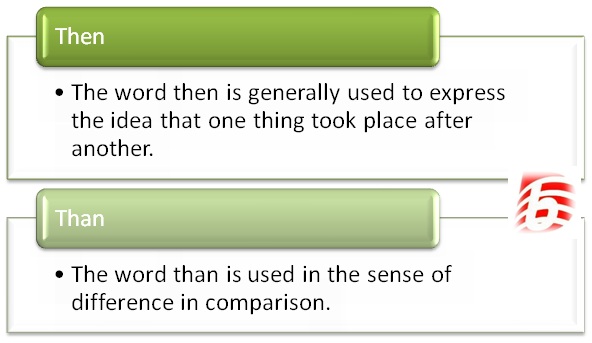There is a marked difference between then and than. The key difference between then and than is that then is an adverb whereas than is a preposition as well as a conjunction. The word then denotes time and is used in the sense of both past tense and the future tense. The word than is used in a comparison. The difference between then and than is explained in this article.
Key Takeaways
- Then is an adverb, while than can be both a preposition as well as a conjunction.
- Then denotes time, whereas than is used in comparisons.
- Correct usage of these two words is essential in English grammar practice.
What Does Then Mean?
Before delving into the difference between then and than, first of all, let us have a look at the definition given to each of these terms, then and than, by the Oxford English dictionary. The adverb then means “at that time; at the times in question.”
You normally compare two objects in the figure of speech called Simile. A simile is a figure of speech where there is a wealth of similarity between two objects.
For example, you compare two things, namely, a good person and a mountain and say,
Good people are lofty like mountains but softer than mountains.
In this figure of speech, you compared a good person to a mountain. At the same time, you observed that he was not hard like the mountain. He is softer than the mountain. Hence, the word ‘than’ is used in the second part of the comparison.
The word than is used in the sense of difference in comparison.
She likes sweets more than nuts.
What Does Than Mean?
The conjunction than, which is as well as a preposition has the description “introducing the second element in a comparison” as its definition in the Oxford English dictionary.
The word then is generally used to express the idea that one thing took place after another. For example,
No sooner I entered the house then the telephone started ringing.
Because of the use of then in this sentence, it is clear to us that this telephone started to ring after the narrator entered the house.
The word then at times adds information to an expression. Look at the following sentence.
He went to the office as usual at 10 a.m. Then the trouble started.
When we read the above two sentences, we understand that the second sentence, which begins with then, has added some information to the idea given by the first sentence.
It is important to note that the word then is often used in the sense of reiteration. For example,
These problems that I enlisted, then, are the reasons for my bad health.
The word then is also used to convey the sense of a consequence. Look at the sentence mentioned below.
If I miss the bus today, then I would catch the train to reach my office in time.
The word then, on the contrary to than, is used to indicate the next thing in the series of happenings or actions.
He ate two loaves of bread and then drank a glass of milk.
The use of then in this sentence shows that this person ate bread first and after that drank a glass of milk.
What is the Difference Between Then and Than?
Then vs Than
Then indicates something ‘at that time; at the time in question or something after that; next’
Than indicates ‘the second element in a comparison or an exception or contrast’
Grammatical Category
Then is an adverb
Than is a preposition as well as a conjunction
Usage
The word then is used to add information to an expression, is often used in the sense of reiteration, to convey the sense of a consequence and sequence of something.
The word than is used in the sense of the difference in comparison.
Summary – Then vs Than
The two words then and than have a clear difference in their grammatical category and their usage. The difference between then and than is that then is an adverb while than can be both a preposition as well as a conjunction. The correct usage of these two words is an essential fact in English grammar practice.
